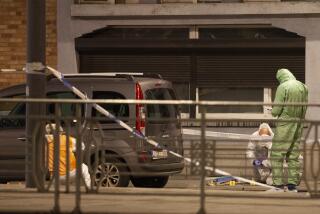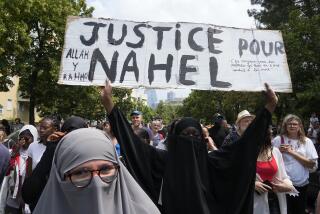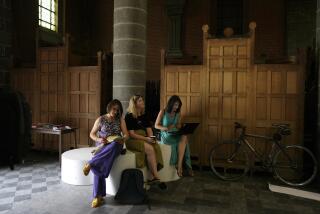Torn by Language : In Belgium, ‘There Are No Belgians’
- Share via
FOURON-LE-COMTE or GRAVENVOEREN, Belgium — Two cafes, side by side, face the church in the central square of this tiny Belgian village.
Cafe Wynants, on the corner, posts its menu, specials of the day, notices and advertising all in Dutch. Its neighbor, Chez Liliane, posts its menu, specials, notices and advertising all in French. No French speaker ever goes into Cafe Wynants for a drink or snack. No Dutch speaker ever goes into Chez Liliane.
The two separate and antagonistic cafes, serving divided neighbors from the same village, reflect the great blight of little, industrious Belgium--the continuing failure of reason and compromise to still the Belgian passion and fury over language.
Issue Won’t Go Away
Sometimes years of quiet pass, lulling some Belgians into believing they have put their language problems behind them. But the issue is so raw and persistent it inevitably flares up again.
That has happened in the last few months here alongside the Netherlands border in the small commune--a township--of six villages known as the Fourons in French and the Voeren in Dutch. Fouron-le-Comte (Gravenvoeren in Dutch) is the largest of these farming villages that together have a population of only 4,200.
For Jose Happart, a Socialist French-speaking farmer elected mayor by the commune council and deposed by the government for refusing to speak Dutch, the problem is simple: Two-thirds of the people of the Fourons speak French, but the commune is part of the Dutch-speaking province of Limburg--and they want out.
Unspeakably Complex
“We will not accept any solution that keeps us in the province of Limburg,” Happart said in a recent interview.
For Prime Minister Wilfried Martens, a Dutch-speaking Christian Democrat who has run Belgium for almost eight years, the problem is painfully complex. The issue may seem simple, even silly on the surface, but it seethes with enough anger to endanger the delicate linguistic balance keeping his government together.
“I am convinced,” he said somewhat bitterly in a recent television interview, “that, with a minimum of good will, this difficulty would not exist.”
Many Belgians seem ashamed of the fuss. “The government may not have fallen yet,” said La Libre Belgique, a French newspaper in Brussels, “but it has certainly fallen into ridicule.”
“We are making ourselves a laughing stock in the eyes of the world,” said Deputy Prime Minister Jean Gol.
It is easier, however, to lament the problem than deal with it.
Although many people in the rest of the world do not realize it, Belgium, throughout its short history of 150 years, has always been a divided and artificial country. Agatha Christie’s fictional French-speaking detective, Hercule Poirot, often complained that people did not realize he was Belgian, but, in real life, most Belgians do not have that kind of nationalist sensitivity.
As long ago as 1912, Belgian Socialist Jules Destree shocked Belgium with an open letter to King Albert I that began, “Sir, let me tell you the truth, the great and horrifying truth: There are no Belgians. . . . There are only Flemish and Walloons.”
A Country Divided
That feeling is more widespread today. “I have lived here three years,” said a diplomat in Brussels, “and I have only heard the Belgian national anthem played once.”
Belgium is a country of 10 million people, a little less than 6 million living in the Dutch-speaking region of Flanders, a little more than 3 million living in the French-speaking region of Walloon, and another million living in the bilingual capital region of Brussels.
Until recently, the French Walloons dominated Belgium. The Walloons came from one of the most industrialized regions of Europe, and it was widely assumed both inside and outside Belgium that the French language would eventually prevail. No deputy ever spoke Dutch in the Belgian Parliament until 1889. Rich Flemish families learned French, and it was unthinkable to live in Brussels or work in the national government without fluency in French.
Sought Own Language
But the Flemish fought hard for their own language in the 20th Century. Nationalists were furious that Flemish soldiers went to their deaths during World War I on orders they did not understand from Walloon officers. Until 1930, the Flemish had no Dutch-speaking university.
The Flemish nationalist movement was discredited, however, during World War II because some Flemish sympathized with the Nazi German occupiers. But, after a decade, nationalist pressures broke out again, and the Flemish finally won equal status for their language and culture and region. Some of the battling was ugly. Street fighting drove the French-speaking faculty and students out of the ancient French-speaking University of Louvain in 1968.
The change has been dramatic. A somewhat autonomous Flanders, in fact, now dominates Belgium. With the port of Antwerp and a new computer industry, Flanders has left Walloon with its outdated heavy industry far behind. Almost all recent prime ministers have been Dutch-speaking. Some French-speaking youths are muttering in Brussels that they had better learn Dutch if they want to get ahead.
Different Worlds
For an outsider, Belgium sometimes seems less like a bilingual country than an association of two separate communities. The two main regions have cultural autonomy and ignore the other language. The bustling Flemish port of Antwerp is only 60 miles from the sooted, industrial Walloon town of Liege. But they seem to be different worlds.
If you enter a cafe in Antwerp, you overhear Dutch conversations, listen to the radio blare in Dutch and buy apple strudel. If you enter a cafe in Liege, you overhear French conversations, listen to the radio blare in French and buy waffles.
Road signs make few concessions to speakers of the other language. A driver, heading toward Liege in Walloon, will suddenly find, if he enters the region of Flanders, that the signs no longer show him the way to Liege. Liege is known as Luik in Dutch, and the signs therefore show the way to Luik. The Flemish do not intend to help out any ignorant drivers who do not know that.
Bilingual Capital
The main attempt at Belgian bilingualism takes place in Brussels with its odd population of mainly ethnic Flemish people who mainly speak French. Brussels is located inside the region of Flanders, but its people learned French during the days when that was the dominant language of the Belgian government. As a result, a visitor will find that, although Brussels is a mainly French-speaking city, government notices and advertising are in both official languages.
Belgium may be depriving itself culturally by its separation of languages. “People like Maurice Maeterlinck (the Belgian poet and playwright who won the Nobel Prize for Literature in 1911) wrote in French,” said Philip Tirard, the cultural editor of the newsmagazine Le Vif. “But they wrote with a special baroque, coarse, down-to-earth spirit that was Flemish. They were not French writers full of airy ideas and reason.
“I think that is the essence of Belgian culture--expressing a Flemish spirit in the French language,” he continued. “But that is not a very popular idea these days. If I were to state this idea on television, a moderator would say, ‘Thank you very much,’ and quickly pass on to something else.”
A Lack of Identity
History created the divisions and the lack of national identity in Belgium. In the 5th Century, the Germanic-speaking, barbarian Franks halted their invasion of the Roman Empire’s Latinized province of Gaul along the line of what is now Belgium, and that frontier, more or less, still divides one language from another.
A kind of continual crossroads for invaders, Belgium never developed an identity of its own. Although cities like Antwerp, Bruges and Ghent were among the richest and most powerful in Europe during the Renaissance, they did not come together as any kind of territory of Belgium as a whole. The land that is now Belgium passed from the control of the dukes of Burgundy to the Hapsburgs to Spain to Austria to France to the Netherlands.
Belgium did not become an independent nation until 1830, when the Catholic Flemish provinces--worried about the power of the Dutch Reformed Church in Protestant Holland--and the French-speaking Walloon provinces--worried about the power of the Dutch language--united to overthrow Netherlands rule.
The constitutional division of Belgium into the regions of Flanders and Walloon, worked out over two decades and finally put into force in 1980, is accepted by members of both language groups.
Dutch Is Favored
But the largely French-speaking population of Brussels is upset over new rules that favor Dutch speakers in the civil service and limit French language rights in the suburbs. Faced with the anger, the government has postponed all major constitutional decisions on Brussels indefinitely.
The constitutional changes have left a few language pockets that do not fit anywhere. The Fourons is one of them. Although these villages had been regarded historically as Flemish, they were located alongside Walloon, and many of the villagers learned over the years to speak a variety of French.
As part of a compromise involving several other language pockets in Belgium, the government in the 1960s decided to recognize history over reality, putting the Fourons in Flanders even though two-thirds of their population spoke French rather than Dutch.
The compromise was not a satisfactory one, and a former prime minister once described the Fourons as “the porcupine that disturbs the strange garden of Belgian politics.”
Happart, the 39-year-old deposed mayor who still runs the commune as acting mayor, prefers another image. He calls the Fourons “the stone in the shoe” and explains that “a stone can cause a cut that will fester and become infected and even lead to gangrene.”
Political Turmoil
The insistence by Flemish nationalists that Happart follow the rules of Flanders and pass a Dutch language test precipitated a crisis that almost brought down the government of Prime Minister Martens several weeks ago. Unable to keep this government united on the issue, Martens resigned but remained in office when King Baudouin refused his resignation.
A special commissioner has been appointed to try to resolve the issue. But both sides have made the Fourons a focus of principle and pride. Flemish and Walloon nationalists descend upon the village of Fouron-le-Comte on Sundays in rowdy demonstrations of strength.
In some ways, the handful of people in the Fourons are a microcosm of the million who live in the Brussels area. In both cases, the population has its roots in Flanders but its language from Gaul.
The French speakers want to preserve their rights in Brussels, but the Dutch speakers want to stem and perhaps reverse the century’s tide of French there. Even if the problem of Fourons is solved, Brussels is sure to remain as the language battleground of the future.
More to Read
Sign up for Essential California
The most important California stories and recommendations in your inbox every morning.
You may occasionally receive promotional content from the Los Angeles Times.










